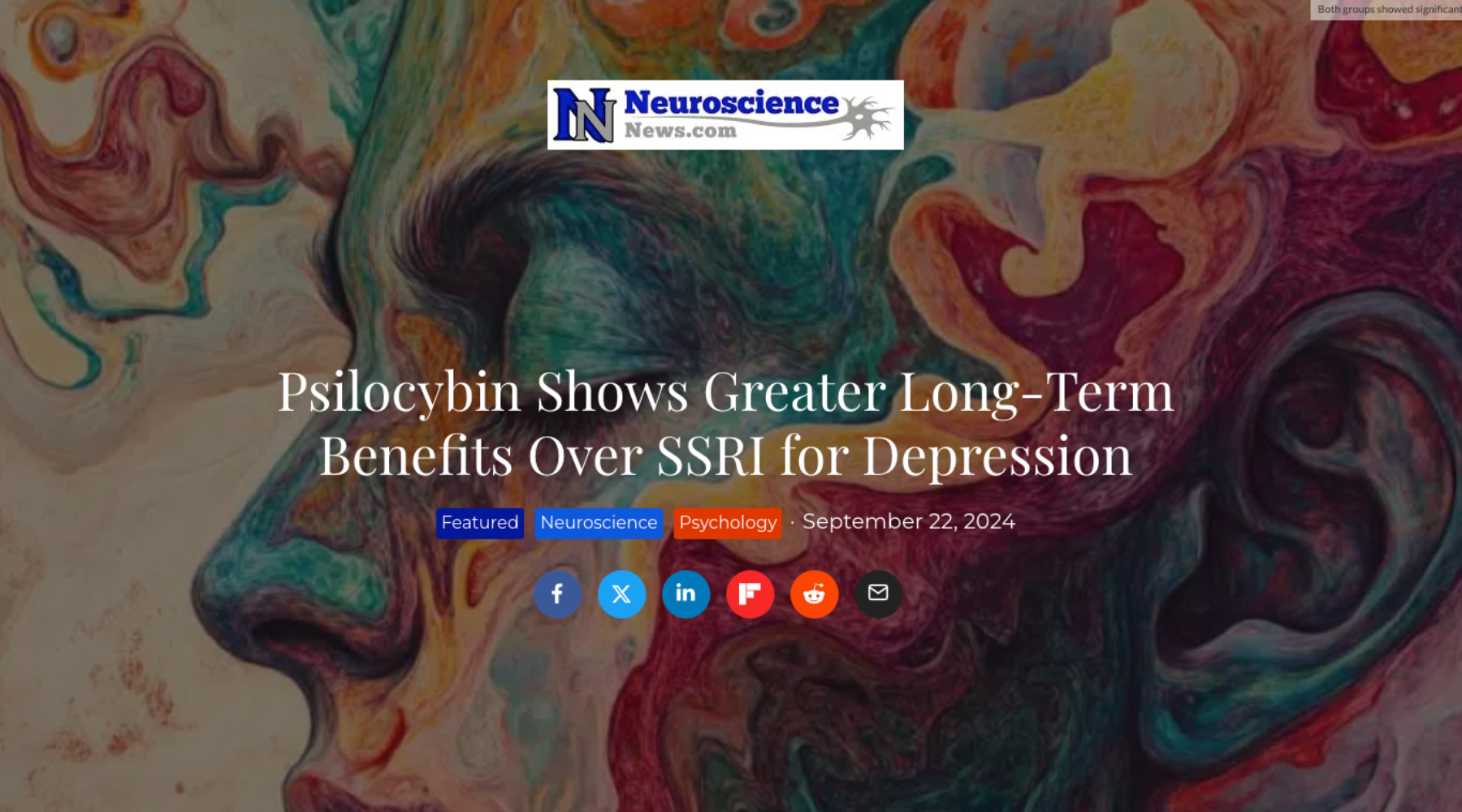
Psilocybin Shows Greater Long-Term Benefits Over SSRI for Depression
REPRINTED FROM Neuroscience News.
Summary: A study comparing psilocybin to the SSRI escitalopram found both drugs improved depressive symptoms similarly over six months, but psilocybin offered additional psychosocial benefits. Patients taking psilocybin reported a greater sense of meaning, psychological connectedness, and improved social functioning.
These results suggest psilocybin could provide a more holistic treatment option for depression, addressing both symptoms and overall well-being. While promising, psilocybin remains experimental and is only administered in controlled environments.
Key Facts:
- Psilocybin and SSRIs both reduced depressive symptoms over six months.
- Psilocybin improved meaning in life, psychological connectedness, and social functioning.
- Psilocybin remains an experimental treatment, administered under strict control.
Source: European College of Neuropsychopharmacology
A direct comparison between the experimental psychedelic drug psilocybin and a standard SSRI antidepressant shows similar improvement of depressive symptoms, but that psilocybin offers additional longer-term benefits.
The comparison, between psilocybin (the active ingredient in “magic mushrooms”) and the SSRI escitalopram gave similar long-term improvements in depressive symptoms over a 6-month period; however, patients taking psilocybin also reported better psychosocial functioning, including experiencing a greater sense of meaning in life and psychological connectedness.
The work is presented for the first time at the ECNP Congress in Milan. A related paper will appear in the journal eClinicalMedicine to coincide with the conference presentation.
Lead researcher Mr. Tommaso Barba (Ph.D. candidate from Imperial College, London) said, “This is the first work to compare the long-term effects of these two drugs in the context of overall well-being, not just freedom from depression.
“In previous work we had found that both treatments led to comparable improvements in alleviating symptoms of depression at the 6-week mark, such as sadness and negative emotions.
“However, this work shows that psilocybin outperformed escitalopram in several measures of well-being, meaning in life, work and social functioning. These results appeared to be maintained over a 6-month follow-up period.
In addition, in previous work we had found that psilocybin also improves sexual drive, in contrast to SSRIs which tend to lower libido in many patients. So overall it seems psilocybin might give additional positive mental health benefits.”
SSRI drugs (selective serotonin reuptake inhibitors), such as Prozac, Paxil and Zoloft, are one of the main types of drugs used to treat depression. However, around a third of patients don’t respond to SSRI treatment, so for them psilocybin may offer an alternative, although this was not studied in this trial.
Barba continued, “SSRIs work well, but not for everyone. They are also associated with some side effects. However this work implies that psilocybin generally seems to offer a real alternative, and perhaps additional benefits, to people who are worried about taking conventional antidepressants.”
The researchers, from Imperial College in London, undertook a 6-month study (phase 2, double-blind, randomized controlled trial) with 59 patients with moderate to severe depression. 30 were treated with a single dose of psilocybin, 29 patients were given a six-week course of escitalopram. Each group received similar psychological support of around 20 hours in total.
Both groups showed significant improvement in depressive symptoms, even up to 6 months after treatment (the researchers stopped monitoring at 6 months). However, those given psilocybin reported greater improvements in social functioning and psychological connectedness, with large effect sizes.
Co-first author Dr. David Erritzoe, Clinical Director and Deputy Head of the Centre for Psychedelic Research, Imperial College, London, commented, “This is important because improving connectedness and having greater meaning in life can significantly enhance a person’s quality of life and long-term mental health.
“The study suggests that psilocybin therapy might be a more holistic treatment option for depression, addressing both the symptoms of depression and overall well-being. This could make a substantial difference in the overall happiness and daily activities of those suffering from depression, providing a more joined-up approach to mental health treatment.”
The researchers note that the patients were only treated for 6 weeks, and that many of the patients received additional treatments over the 6-month follow up.
Dr. Erritzoe cautioned, “Psilocybin is still an experimental drug; it has not yet been approved for general use. It is administered in highly controlled and protected environments: these precautions are not found in recreational psychedelic use, which is known for having unpredictable and potentially harmful effects, especially for vulnerable people struggling with mental health issues.”
Commenting, Johan Lundberg (Adjunct Professor of Psychiatry at the Department of Clinical Neuroscience, Karolinska Institute, Stockholm), was not involved in this work, said, “This report is an important attempt to compare the clinical value of psilocybin compared to a state-of-the-art treatment of major depressive disorder.
“The results come with several caveats, including the lack of a non-inferiority analysis and failure to report other interventions given during the follow-up period. That said, as a hypothesis generating piece it may benefit the field substantially.
“For now, we don’t know if psilocybin will be approved for the treatment of major depression, but if so, it won’t be for everyone. Some future patients might prefer psychedelic treatment over SSRI, but some patients may be intimidated by the dramatic alterations in perception and confrontations with challenging emotions that psychedelic drugs promote.”
About this psychopharmacology research news
Author: Tommaso Barba
Source: European College of Neuropsychopharmacology
Contact: Tommaso Barba – European College of Neuropsychopharmacology
Image: The image is credited to Neuroscience News
Original Research: Open access.
“Effect of psilocybin versus escitalopram on depression symptom severity in patients with moderate-to-severe major depressive disorder: observational 6-month follow-up of a phase 2, double-blind, randomised, controlled trial” by Tommaso Barba et al. EClinicalMedicine
Abstract
Effect of psilocybin versus escitalopram on depression symptom severity in patients with moderate-to-severe major depressive disorder: observational 6-month follow-up of a phase 2, double-blind, randomised, controlled trial
Background
Psilocybin therapy (PT) produces rapid and persistent antidepressant effects in major depressive disorder (MDD). However, the long-term effects of PT have never been compared with gold-standard treatments for MDD such as pharmacotherapy or psychotherapy alone or in combination.
Methods
This is a 6-month follow-up study of a phase 2, double-blind, randomised, controlled trial involving patients with moderate-to-severe MDD. Participants were recruited from a hospital in the UK.
Male or female patients with major depressive disorder (DSM-IV), moderate to severe depression (HAM-D ≥17), no MRI or SSRI contraindications, confirmed diagnosis by a GP or mental healthcare professional, aged 18–80, and competent in English were eligible.
Patients were randomly assigned (1:1) to receive either two 25 mg doses of the psychedelic drug psilocybin administered orally combined with psychological support (‘psilocybin therapy’ or PT) and book-ended by further support or a 6-week course of the selective serotonin reuptake inhibitor (SSRI) escitalopram (administered daily at 10 mg for three weeks and 20 mg for the subsequent three weeks) plus matched psychological support (‘escitalopram treatment’ or ET).
The primary outcome measure was change from baseline in the score on the 16-item Quick Inventory of Depressive Symptomatology–Self-Report (QIDS-SR-16) at week 6, which has been reported previously.
Herein, we present results at the 6-month follow-up time point. Measures of social functioning, connectedness, and meaning in life constituted the study’s secondary outcomes during follow-up. Safety in the follow-up period was not assessed.
This trial is registered at ClinicalTrials.gov, NCT03429075.
Findings
Between January 15th, 2019 and March 20th, 2020, 59 patients were enrolled and 30 (11 females [37%] and 19 males [63%]) were assigned to the psilocybin group and 29 (9 females [31%] and 20 males [69%]) to the escitalopram group. 25 participants in the PT group and 21 in the ET group completed the 6-month follow-up.
At the 6-month follow-up, both PT and ET conditions yielded sustained improvements in depressive symptom severity. The mean between-condition difference in QIDS-SR-16 scores at 6-months was 1.51 (95% CI: −1.35, 4.38; p = 0.311).
Secondary outcomes demonstrated that PT had greater mean between-condition differences in functioning (WSAS: −7.46; 95% CI: −12.4, −2.47; p < 0.001), psychological connectedness (WCS: 11.02; 95% CI: 1.25, 20.83; p = 0.033), and meaning in life (MLQ: 4.86; 95% CI: 0.67, 9.05; p = 0.021) compared to ET.
Interpretation
Six-week intensive treatments with either psilocybin or escitalopram (with psychological support) for MDD were associated with long-term improvements in depressive symptom severity. The greater degree of improvement in the PT arm at follow-up on psychosocial functioning, meaning in life, and psychological connectedness suggests warrant future research. However, these results are descriptive and should be interpreted with caution.
Key limitations of the study include its suboptimal power to detect small but meaningful differences between treatments, missing data, the potential use of additional interventions during the follow-up period, and reliance on self-reported treatment assessments. These factors may affect the interpretation of the study findings and should be considered when evaluating the results.
Funding
The Alexander Mosley Charitable Trust and by the founding partners of Imperial College London’s Centre for Psychedelic Research.

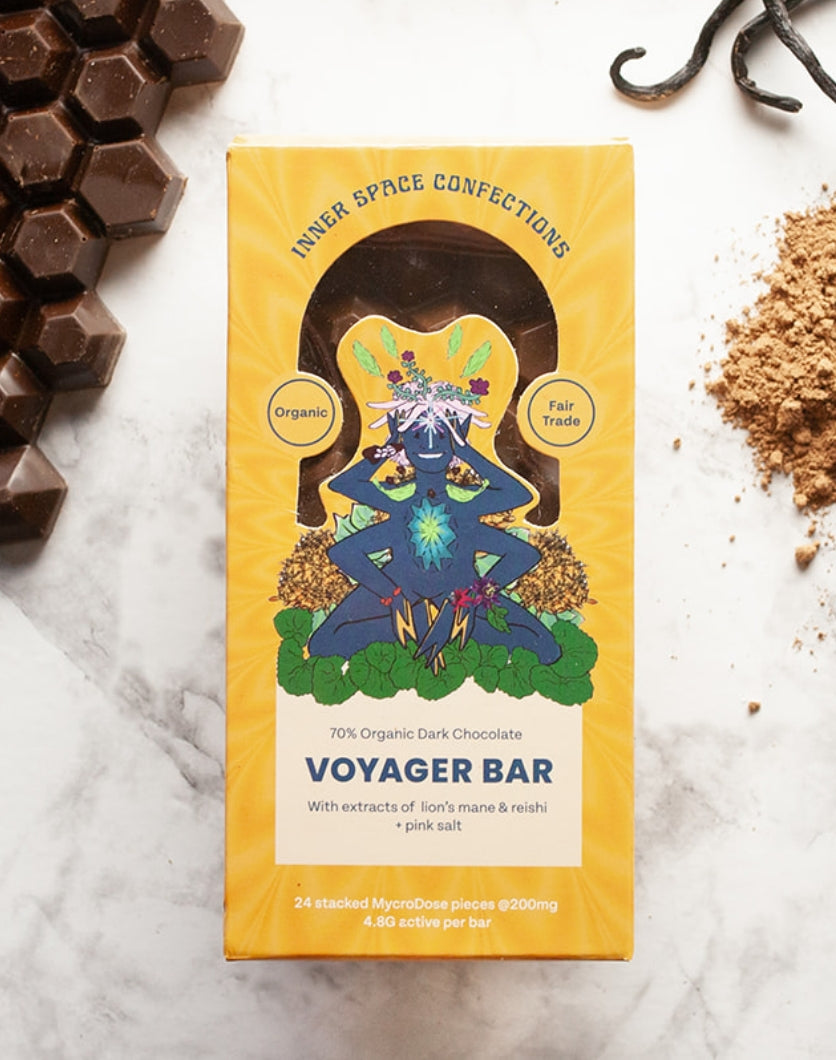
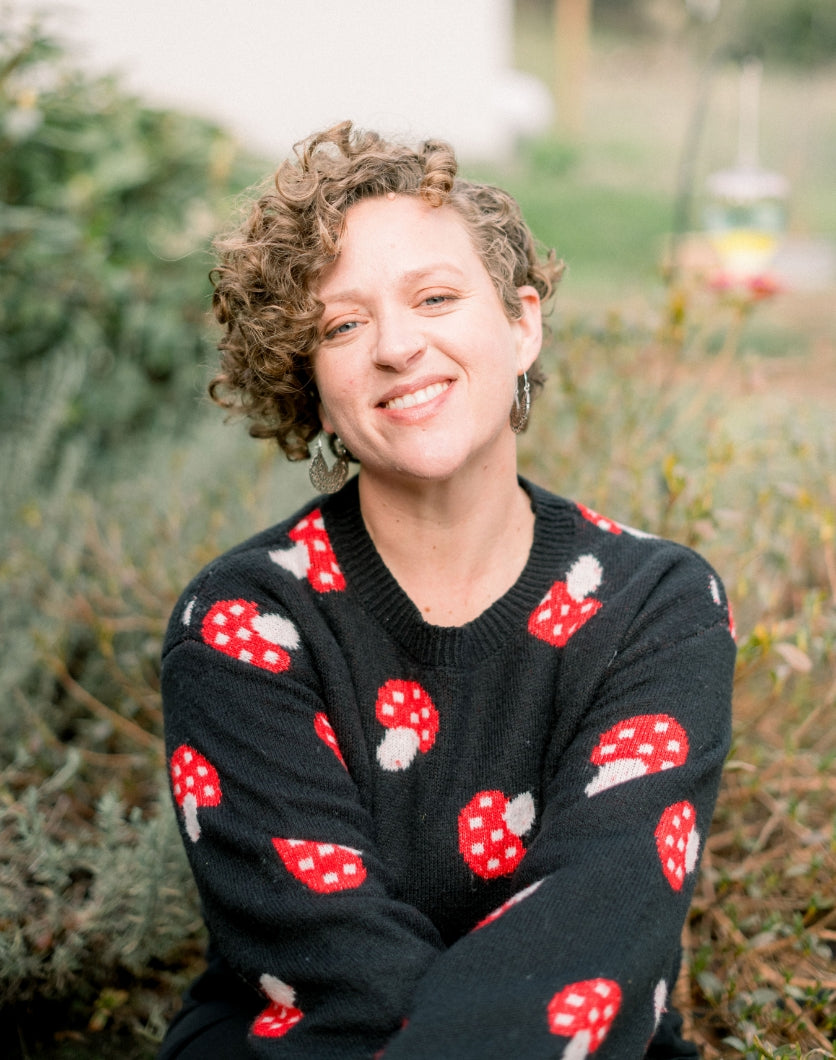
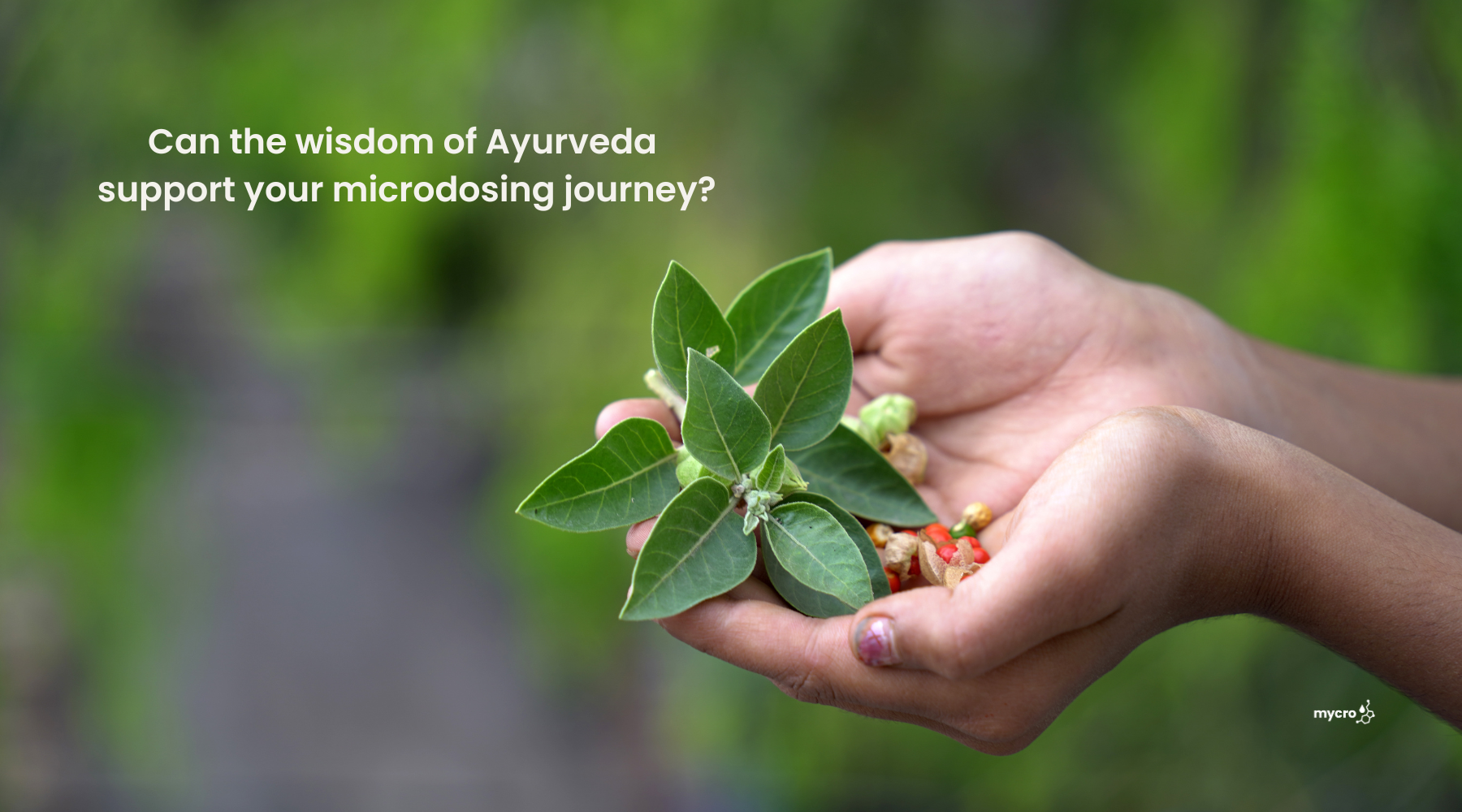
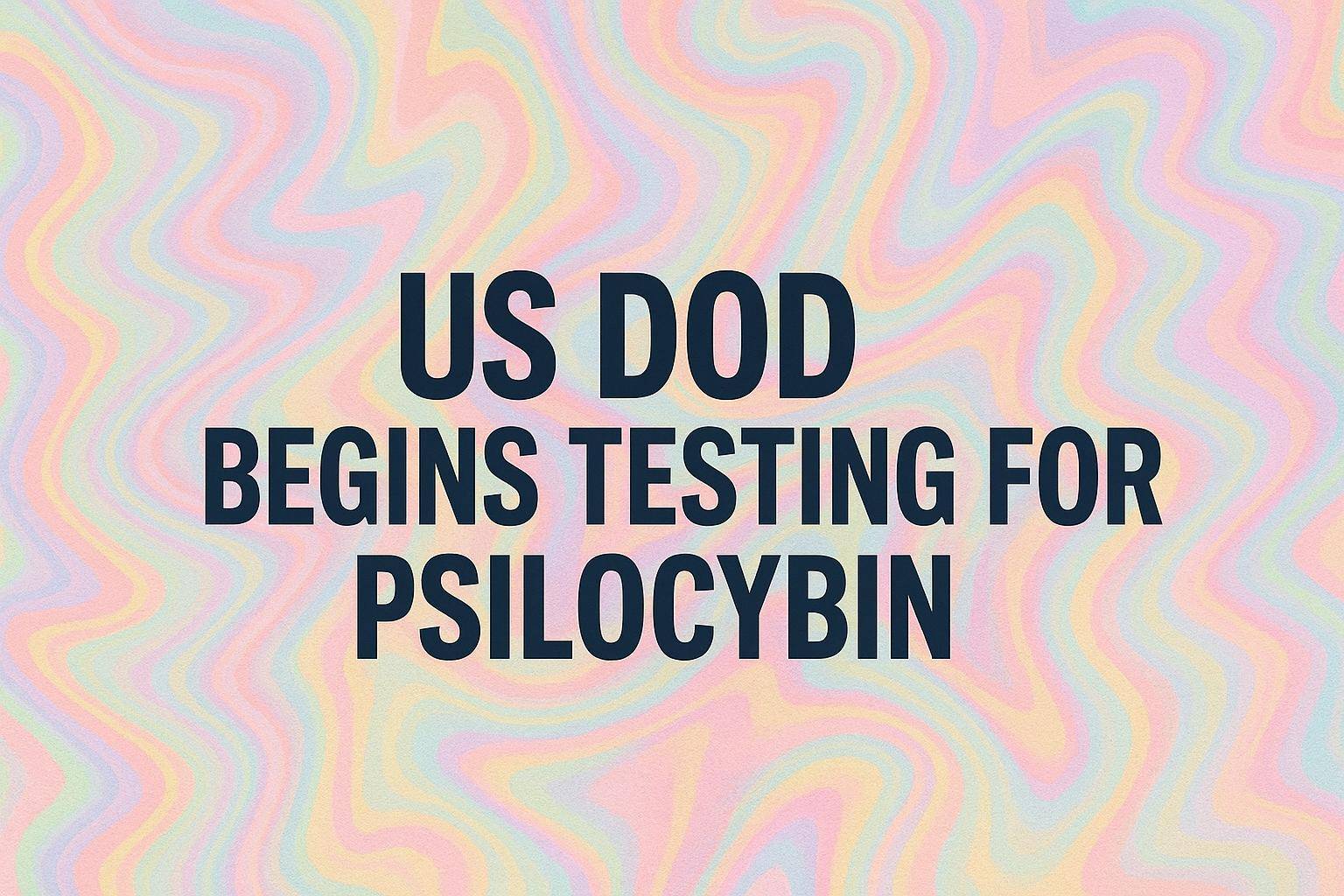
Leave a comment
This site is protected by hCaptcha and the hCaptcha Privacy Policy and Terms of Service apply.